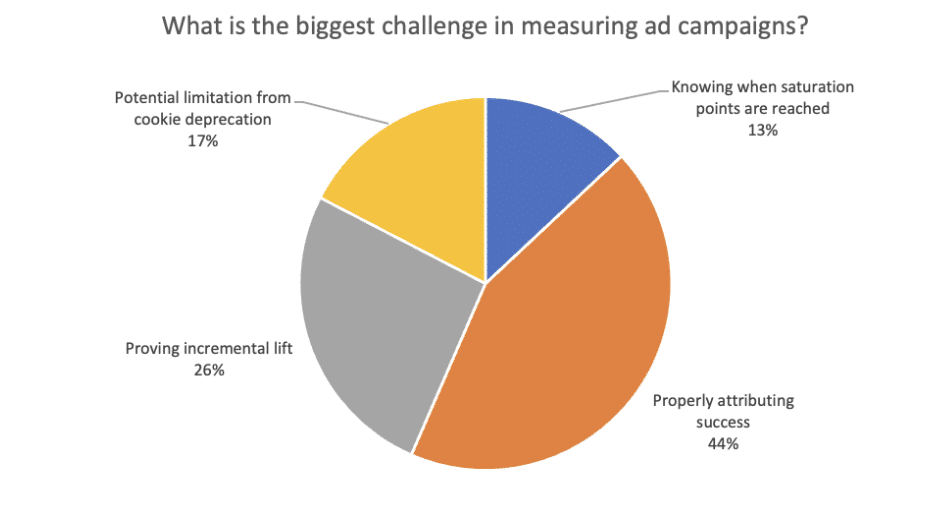Last month, we hosted a fantastic webinar on how to model your marketing mix with machine learning. Linor Ben-El and Noam Chiger provided great insights into marketers’ channel and campaign measurement challenges. They also explored how a machine learning-based approach to marketing mix modeling can help overcome these challenges while driving incremental results.
Within the webinar, we asked the audience what their biggest challenge was when it came to measuring ad campaigns. Overall, 44% of the polled audience said that properly attributing success was the biggest challenge.
Poll results during Pecan's MMM webinar
As high as this number is, I’m not surprised. I know how complex the user journey is these days and that there are so many different ways to measure an ad campaign. So, it isn’t surprising that so many businesses have a hard time knowing how and where to attribute campaign success.
In fact, a recent DemandLabs study found that 60% of marketers struggle to appropriately attribute marketing activities to revenue outcomes.
Knowing that so many marketers find it tough to properly attribute campaign success or connect marketing activities with revenue outcomes, I wanted to share how machine learning can help solve this problem. ML can alleviate stress for marketing science and performance marketing teams.
The Most Common Attribution Challenges
Before exploring how machine learning can help with your attribution problems, I wanted to first talk about why it is so difficult to properly attribute success to an ad campaign, channel, or message.
Numerous sources have collected data on this topic over the years. Publications like The Drum, Instapage, SearchEngineLand, etc., have done a nice job summarizing some of the most common attribution challenges marketers have to address. When looking through these sources, I identified three key challenges marketers face in proper attribution.
Challenge 1: Changes in data collection
Over the years, changes in data collection have made it more challenging to attribute the success of an ad campaign. GDPR and CCPA are the biggest drivers of these changes, as these regulations require enhanced user consent and a higher level of transparency from brands. They also place restrictions on the type of data a brand may collect.
In addition to massive regulatory changes, we are also seeing changes from technology platforms like Apple that have significantly altered how ad platforms report on mobile ad campaigns.
The Apple ATT privacy framework was introduced for all Apple devices after the release of iOS 14 (and enforced after iOS 14.5) to limit the amount of user data app developers can share with other companies. As a result, brands are limited to aggregated data and are unable to get visibility into the specific events that led to an install or a conversion. Apple’s ATT and SKAN are major concerns for any mobile marketer.
There are also other issues relating to data collection caused by ad-blocking technology and ad fraud. Roughly 47% of the global internet population uses an ad blocker that prevents them from being served ads. Furthermore, ad fraud costs advertisers significant amounts — roughly $65B in 2021 — making it more difficult for advertisers to determine the true impact of their campaigns. Both of these issues may result in inaccurate attribution.
Overall, these changes in data collection and measurement have made it more challenging for advertisers to accurately attribute campaigns’ success. Advertisers must now use a combination of methods and data sources to track and measure the impact of their campaigns.
Challenge 2: The customer journey is changing, and it's getting really complicated
Today, the average consumer sees between 4,000 to 10,000 ads a day. With the rise of digital media, there are now multiple channels and platforms where ads can be displayed.
Since these channels are so fragmented, marketers must deal with data silos, making it difficult to integrate and analyze data effectively. This situation can make it challenging to gain insights into the customer journey and optimize marketing strategies accordingly.
In addition to channel fragmentation, there is also channel convergence. According to ad agency Ogilvy, 95% of consumers have a mobile device in hand when watching TV.
Let’s play out a scenario. Say a consumer is watching television and sees a commercial. The consumer is also using their phone and decides to research the advertised company. The user searches for the brand, clicks on a Google ad, and then buys something from the website.
Based on this user experience, which channel would get credit for the conversion? Well, it depends on the attribution method. A digital attribution methodology would give Google 100% of the credit, not accounting for the TV ad that drove the initial inquiry.
As you can see, as the media landscape fragments and converges, it’s more challenging to attribute campaign success to specific channels, messages, or multi-screen experiences.
As a result, advertisers need new tools and technologies to measure new media consumption habits to remain competitive in today’s marketplace.
Challenge 3: Methodology flaws
Today, methodology flaws can significantly impact campaign attribution by distorting the accuracy of attribution results. For instance, attribution bias can happen when a model is weighted heavily for a particular touchpoint. Doing so will increase the odds of the channel being overvalued, while undervaluing others. Unfortunately, given that many MTA platforms rely on manual weighting, it is difficult to avoid attribution biases.
Additionally, poor data quality can significantly impact attribution results. If the data used to calculate attribution is incomplete, inaccurate, or outdated, it can skew the results and make it difficult to get an accurate picture of campaign success.
How machine learning can help marketers attribute campaign success
AI and machine learning have become essential tools for marketers seeking a competitive edge in today’s rapidly evolving landscape. As the marketing industry becomes increasingly data-driven, the ability to analyze vast amounts of data and make informed decisions based on that data is becoming critical.
With the explosion of opportunities to incorporate AI and machine learning into the marketing process, we are seeing a new era of martech that can help marketers attribute campaign success.
Advanced data analytics techniques can analyze large datasets and identify patterns in consumer behavior that were not previously recognizable by human analysts.
That said, we’ve identified three ways machine learning can help marketers attribute campaign success right off the bat.
Uncovering insights
Due to the complex and multi-channel nature of the customer journey, it can be challenging for marketers to uncover meaningful insights from their data. Machine learning can help by analyzing large datasets and identifying patterns and trends in customer behavior. These insights can help marketers better understand their audience.
Time spent on mundane tasks
Marketers might be put off from using more sophisticated predictive techniques because of data preparation challenges. Cleaning and organizing data can be a time-consuming and labor-intensive task. Automated machine learning can help this process by using algorithms to identify and clean data errors and inconsistencies. This approach can free up analysts’ time and allow marketing teams to focus on effective actions based on modeling results.
Knowing where to allocate your next dollar
The whole notion of attribution is to understand performance and drive your optimization strategy. Marketers are often faced with the challenge of deciding where to allocate their marketing budget for maximum impact. Machine learning provides insights into which efforts drive the most engagement and conversions.
If you want to learn more about how machine learning can improve your marketing attribution approach, check out our whitepaper, The CMO’s Guide to Predictive Analytics.
In the guide, we talk about key hurdles that marketing teams need to overcome, how machine learning can help improve team efficiencies, and how four ML-based predictive models can help marketers optimize campaigns and make data-driven decisions.
Get a personal tour of how Pecan can help with your marketing challenges. Get in touch now for a quick demo of our platform and its capabilities.




